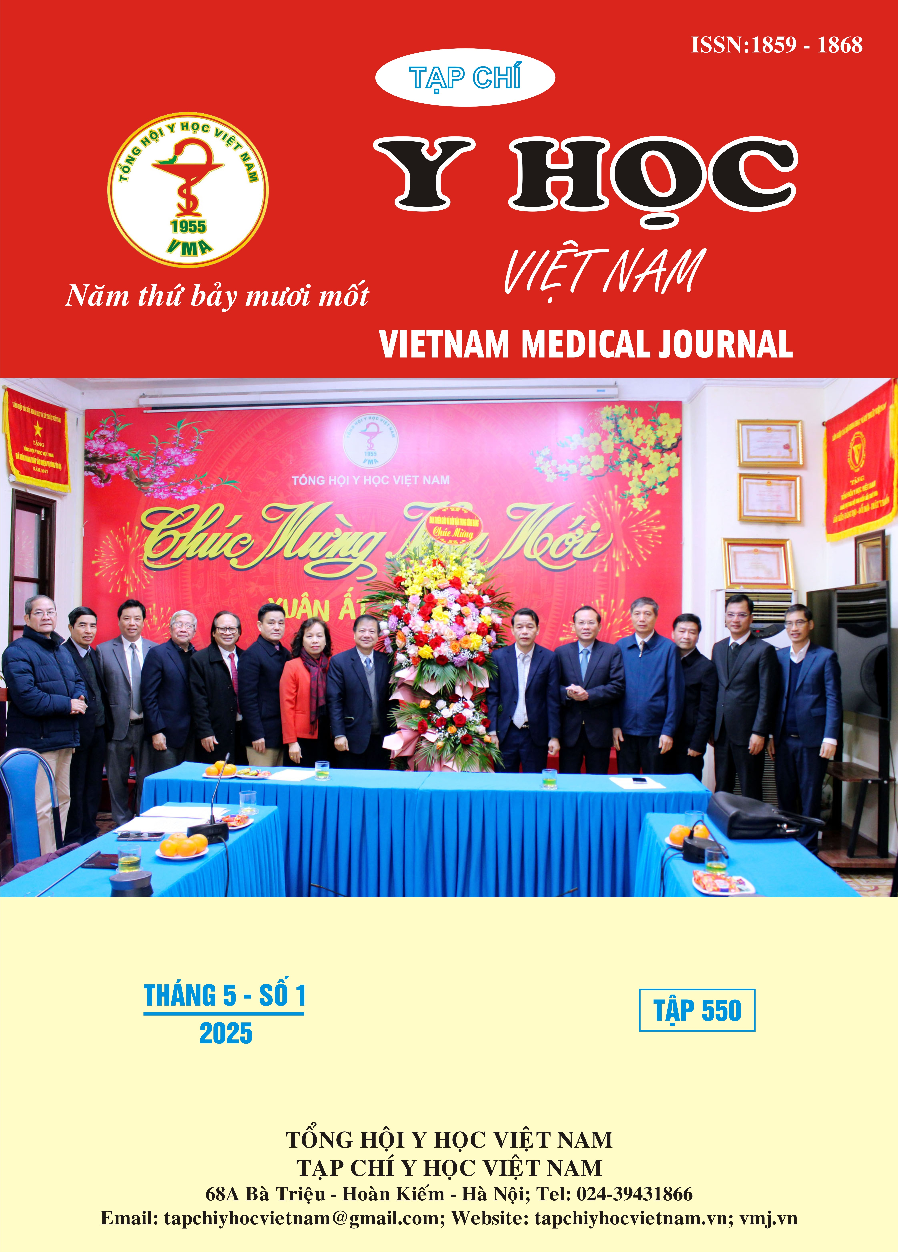ĐÁNH GIÁ CHẤT LƯỢNG CUỘC SỐNG CỦA NGƯỜI BỆNH SAU PHẪU THUẬT ĐIỀU TRỊ UNG THƯ TUYẾN GIÁP THỂ NHÚ TẠI BỆNH VIỆN ĐẠI HỌC Y DƯỢC THÀNH PHỐ HỒ CHÍ MINH – CƠ SỞ 2
Nội dung chính của bài viết
Tóm tắt
Mở đầu: Ung thư tuyến giáp thể nhú là loại ung thư tuyến giáp phổ biến nhất, chiếm 80-85% trong tổng số các trường hợp ung thư tuyến giáp. Phẫu thuật là phương pháp điều trị chính cho loại ung thư này, nhưng chất lượng cuộc sống của bệnh nhân sau phẫu thuật thường bị ảnh hưởng bởi các thay đổi về thể chất và tâm lý. Đối tượng và phương pháp: Nghiên cứu tiến hành trên 100 bệnh nhân sau phẫu thuật điều trị ung thư tuyến giáp thể nhú tại Việt Nam, sử dụng các bộ thang đo chi tiết như HADS, VHI, và EORTC QLQ-H&N35 để đánh giá toàn diện chất lượng cuộc sống. Các dữ liệu lâm sàng và tâm lý được thu thập và phân tích định lượng. Kết quả: Trong số 100 bệnh nhân, 60% báo cáo triệu chứng mệt mỏi (điểm trung bình: 6.5/10) và 40% bị đau nhói vùng cổ (điểm trung bình: 4.3/10). 40% bệnh nhân gặp vấn đề lo âu (HADS trung bình: 8/21) và 35% có dấu hiệu trầm cảm (HADS trung bình: 6.5/21). Điểm số VHI dao động từ 31-60, biểu thị ảnh hưởng trung bình đến giọng nói. 75% bệnh nhân quay lại công việc trong vòng 3 tháng sau phẫu thuật, nhưng 25% cho biết năng suất lao động giảm đáng kể. Kết luận: Phẫu thuật điều trị ung thư tuyến giáp thể nhú mang lại hiệu quả cao trong việc kéo dài sự sống, nhưng các ảnh hưởng tiêu cực đến chất lượng cuộc sống cần được chú trọng. Nghiên cứu nhấn mạnh sự cần thiết của các can thiệp hậu phẫu như vật lý trị liệu, hỗ trợ tâm lý và các chương trình phục hồi chức năng. Các thang đo như HADS, VHI, và EORTC QLQ-H&N35 cung cấp các đánh giá chi tiết, hỗ trợ việc nhận biết và can thiệp hiệu quả để cải thiện chất lượng cuộc sống cho bệnh nhân
Chi tiết bài viết
Từ khóa
ung thư tuyến giáp thể nhú, chất lượng cuộc sống, hỗ trợ tâm lý
Tài liệu tham khảo
2. Patel KN, Shaha AR. Advanced Differentiated Thyroid Cancer. Otolaryngologic Clinics of North America. 2019;52(4):633-46.
3. Papaleontiou M, Reyes-Gastelum D, Ward KC, al. e. Worry in Thyroid Cancer Survivors. Thyroid. 2019;29(8):1081-90.
4. Tseng W, Velez-Cubian F, Nguyen P, Morlando M. Impact of surgery on the quality of life in thyroid cancer patients. Journal of Thyroid Research. 2021;2021:Article ID 1234567.
5. Thatipamala P, Noel JE, Orloff L. Quality of Life After Thyroidectomy for Hashimoto Disease in Patients With Persistent Symptoms. Ear Nose Throat J. 2022;101(7):Np299-np304.
6. Bongers PJ, Greenberg CA, Hsiao R, Vermeer M, Vriens MR, Lutke Holzik MF, et al. Differences in long-term quality of life between hemithyroidectomy and total thyroidectomy in patients treated for low-risk differentiated thyroid carcinoma. Surgery. 2020;167(1):94-101.
7. Kim BH, Ryu SR, Lee JW, Song CM, Ji YB, Cho SH, et al. Longitudinal Changes in Quality of Life Before and After Thyroidectomy in Patients With Differentiated Thyroid Cancer. J Clin Endocrinol Metab. 2024;109(6):1505-16.
8. Büttner M, Locati LD, Pinto M, Araújo C, Tomaszewska IM, Kiyota N, et al. Quality of Life in Patients With Hypoparathyroidism After Treatment for Thyroid Cancer. J Clin Endocrinol Metab. 2020;105(12).
9. Landry V, Siciliani E, Henry M, Payne RJ. Health-Related Quality of Life following Total Thyroidectomy and Lobectomy for Differentiated Thyroid Carcinoma: A Systematic Review. Curr Oncol. 2022;29(7):4386-422.
10. Chandrasekhar SS, Randolph GW, Seidman MD, Rosenfeld RM, Angelos P, Barkmeier-Kraemer J, et al. Clinical practice guideline: improving voice outcomes after thyroid surgery. Otolaryngol Head Neck Surg. 2013;148(6 Suppl):S1-37.


